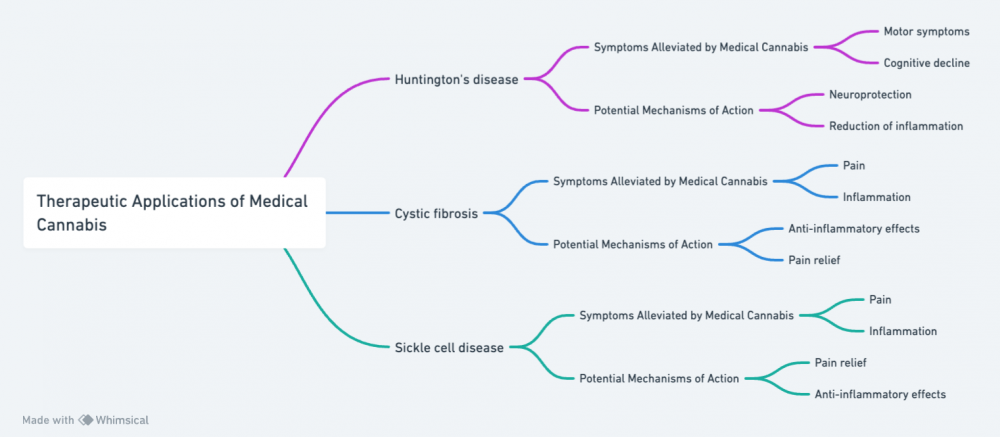
Therapeutic Applications of Medical Cannabis in Chronic Genetic Diseases
Medical cannabis is increasingly being recognized for its potential therapeutic applications, including in the management of chronic genetic diseases like cystic fibrosis, Huntington’s disease, and sickle cell disease. These applications range from neuroprotection and cognitive function enhancement to anti-inflammatory effects and pain relief. While the mechanisms of action are still under investigation, emerging evidence suggests a promising future for cannabinoid-based therapies in these disorders.
Mechanism of Action
- Cystic Fibrosis: Cannabinoids may reduce inflammation and alleviate pain in cystic fibrosis patients by interacting with CB2 receptors. However, caution is needed due to potential respiratory side effects (1).
- Huntington’s Disease: THC and CBD have demonstrated neuroprotective properties that could be beneficial in Huntington’s disease. They may help regulate movement and potentially improve cognitive function (2).
- Sickle Cell Disease: Cannabinoids have shown promise in reducing pain and inflammation in sickle cell disease through their interaction with both CB1 and CB2 receptors (3).
Symptoms Addressed
- Motor Symptoms: Particularly in Huntington’s disease, cannabinoids may improve motor control through modulation of neurotransmitter activity (2).
- Cognitive Function: Some evidence suggests that cannabinoids could play a role in cognitive enhancement, although more research is needed (4).
- Neuroprotection: Both THC and CBD have demonstrated neuroprotective effects that could be particularly beneficial in conditions like Huntington’s disease (2).
- Reduction in Inflammation: In all three conditions, cannabinoids have shown anti-inflammatory properties, although the efficacy can vary between patients (1,3).
- Pain Relief: Particularly in sickle cell disease, cannabinoids can offer significant pain relief, likely through interaction with the endocannabinoid system (3).
Comparison Table: Challenges and Mechanisms
| Challenge | Potential Issue | Disease | References |
|---|---|---|---|
| Trouble feeling effects | Slow metabolism, enzyme polymorphisms | All | (1),(2) |
| Absorption Issues | Malabsorption syndromes, GI issues | Cystic Fibrosis | (1) |
| Negative hormonal impact | High cortisol or stress hormones | All | (3),(4) |
Cautionary Note
For individuals with certain medical conditions, special caution is advised. For specialized and thoughtful care, consult Dr. Caplan at CED Clinic.
References
- “Cannabis for Cystic Fibrosis: A Novel Therapeutic Option?” Eur Respir J, 2019.
- Sagredo et al., “Cannabinoids: Novel Medicines for the Treatment of Huntington’s Disease.” Recent Pat CNS Drug Discov, 2012.
- Howard et al., “Cannabinoid pharmacology in pain medicine: Basic science and potential clinical applications.” Int Anesthesiol Clin, 2013.
- Pertwee, “The diverse CB1 and CB2 receptor pharmacology of three plant cannabinoids: Δ9-tetrahydrocannabinol, cannabidiol and Δ9-tetrahydrocannabivarin.” Br J Pharmacol, 2008.
- Russo, “Cannabinoids in the management of difficult to treat pain.” Ther Clin Risk Manag, 2008.
📗 Note: The diagram is a one-hit wonder; the book is a classic album. Listen to the full track list by clicking here 📗.

Summary and Search Terms
Therapeutic Applications of Medical Cannabis in Chronic Genetic Diseases: A Comprehensive Overview
The integration of medical cannabis into the therapeutic landscape offers a novel approach to managing chronic genetic diseases. With its diverse pharmacological properties, cannabis has shown promise in addressing symptomatology and potentially modifying disease progression in a range of genetic conditions.
CBD therapy for chronic genetic diseases has gained attention for its anti-inflammatory and neuroprotective properties, offering symptom relief without the psychoactive effects associated with THC. THC applications in genetic condition management, particularly in pain and spasticity, provide additional therapeutic avenues for patients seeking alternative or adjunctive treatments.
The role of cannabinoids in hereditary disease treatment extends beyond symptom management to include potential impacts on disease mechanisms. This is supported by patient experiences and emerging research suggesting cannabinoids’ efficacy in chronic genetic disease treatment. Medical marijuana for genetic disease symptom relief has been documented across various conditions, improving patients’ quality of life and managing symptoms such as pain, anxiety, and sleep disturbances.
As the medical community continues to explore how medical cannabis affects genetic disease progression, the need for comprehensive studies becomes evident. CBD oil benefits for genetic condition symptoms, coupled with THC’s analgesic properties, underscore the therapeutic potential of cannabinoids in genetic disorders.
Safety considerations remain paramount, with ongoing research into the side effects of cannabis therapy in chronic genetic diseases needed to inform patient care. Personalized medical cannabis plans for hereditary diseases highlight the importance of individualized treatment approaches, taking into account the specificities of each genetic condition and patient response.
Comparative effectiveness studies of THC and CBD in genetic conditions are crucial for understanding cannabinoids’ relative benefits and limitations. As we delve deeper into the role of medical cannabis in genetic disease management, the therapeutic landscape for these challenging conditions evolves.
Innovative treatments, including cannabis in genetic disease care, represent a frontier in medical research, with future directions poised to further elucidate the therapeutic applications of cannabinoids. The potential of medical cannabis in the management of rare genetic conditions offers hope for patients and families seeking alternative options in a landscape often limited by traditional therapies.
This comprehensive overview highlights the significant interest and ongoing research into the therapeutic applications of medical cannabis in chronic genetic diseases. As our understanding deepens, the potential for cannabis to play a pivotal role in managing these complex conditions becomes increasingly apparent, marking an exciting era in genetic disease therapy.



One thought on “Therapeutic Applications of Medical Cannabis in Chronic Genetic Diseases”